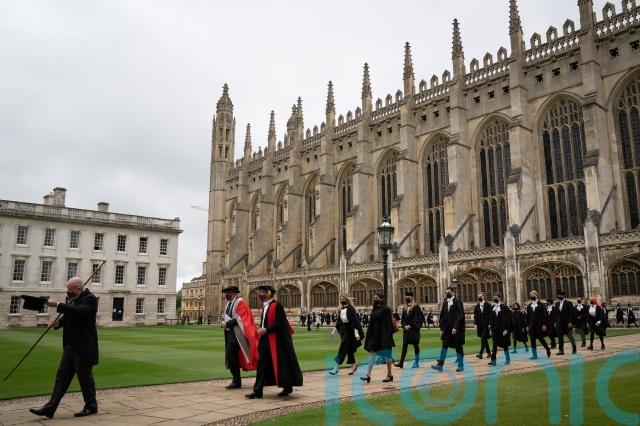
The number of first-class degrees awarded has continued to rise, with one in three students achieving the top grade, according to data published by the Higher Education Statistics Agency (HESA) on Tuesday.
In 2020/21, more than a third – 36% – of degrees were firsts, achieving a final grade of 70% or above, compared with 35% in 2019/20, and 28% in 2018/19.
Just 14% of degrees were awarded a first in 2009/10.
The proportion of degrees achieving a 2:2 fell from 15% in 2019/20 to 14% in 2020/21. The latest HESA figures also show that 46% of degrees were awarded a 2:1, while 3% were a third (2:2) or a pass.
More female students gained a first, or a 2:1, than male students last year, the figures show.
HESA’s researchers say the high proportion of top degrees for the second year running could be explained by universities changing the ways they assessed students to mitigate for the effects of coronavirus disruptions.
Universities in 2019/20 – the first year of the pandemic – adopted “no detriment”, or safety net, assessment policies because of Covid’s impact. These typically ensured that students would not be awarded a final grade that was lower than the university’s most recent assessment of their work.

Researchers for HESA in 2020/21 said that while “blanket ‘no detriment'” policies were not in place last year, other assessment changes, such as open-book exams, helped students to achieve top degrees for the second year in a row.
The researchers said that policies in place at universities last year varied, “but they mainly look like they make it easier for students to claim extenuating circumstances and arrange resits/resubmissions for assessments disrupted by the pandemic”.
“Couple that with the fact that most assessments remained online, normally with some change in format (open book, to deal with difficulty of online proctoring, self-timed, with extended time, etc), and you see the effects of the 2019/20 no detriment policies remaining for a second year,” they added.
For example, at University College London most online exams took place over a 24-hour period to give students flexibility about when to take their exams.
Students at Brunel University, London, were offered an “uncapped” second attempt to sit their January exams if they failed them as part of a number of safety net measures last year.
The news comes after universities were told in January that they must explain increases in 2:1 and first-class degrees, and that if they cannot do so, they should look to limit the number of top degrees they are awarding.
Data from Universities UK (UUK) published in January showed that four in five universities are now looking at the way they calculate degree classes to control grade inflation.
UUK said that some of the increases in top degrees “reflect genuine student improvements and better teaching methods and assessment”.
But it added: “Where providers can’t easily explain the increases, they should look at their data and policies to understand and then – if necessary – reduce the trend.”
The data released on Tuesday showed that the total number of degrees awarded, including masters qualifications, increased by 9% last year compared with 2019/20, with most of the increase made up through a rise in part-time first degrees.
Nick Hillman, director of the Higher Education Policy Institute (HEPI), said: “These positive new numbers show three things very clearly. First, the naysayers who predicted the Covid crisis would put people off learning were completely wrong.
“Secondly, individuals are largely rational and have responded to an unprecedented crisis by seeking to continue improving themselves through education. Thirdly, it shows how our education system, which has been tested like never before in living memory, has delivered against the odds,” he added.
“Of course, there have been huge challenges for staff and students throughout the crisis and no-one has enjoyed the last couple of years, so we must not make light of the real challenges.
“But these new data reveal one big underlying positive: when tested, our people and our educational institutions have continued to thrive. They have continued to look forward, not back.”
Subscribe or register today to discover more from DonegalLive.ie
Buy the e-paper of the Donegal Democrat, Donegal People's Press, Donegal Post and Inish Times here for instant access to Donegal's premier news titles.
Keep up with the latest news from Donegal with our daily newsletter featuring the most important stories of the day delivered to your inbox every evening at 5pm.